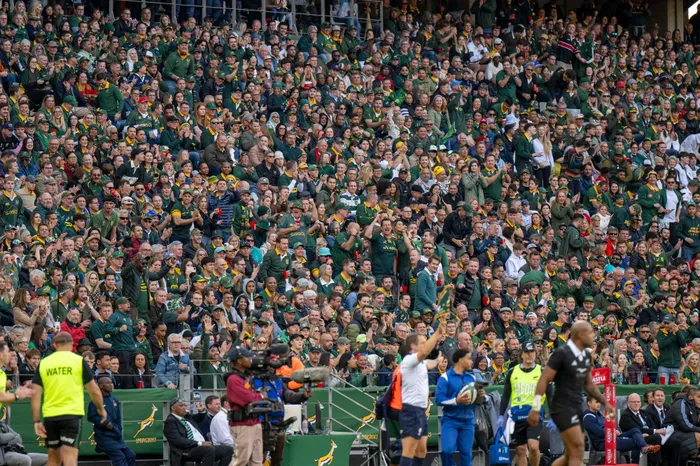SA Rugby defends ticket prices amid backlash, but pledges review

South Africans have turned to social media in recent months to vent their frustrations, with many hesitant to spend their hard-earned money to watch the double world champion Springboks.
Image: Henk Kruger / Independent Newspapers
SA Rugby chief executive Rian Oberholzer has defended the current ticket prices for Springbok matches following recent criticism from the public.
South Africans have turned to social media in recent months to vent their frustrations, with many hesitant to spend their hard-earned money to watch the double world champion Springboks.
The 2025 incoming Test schedule is less glamorous than in 2024, when Ireland visited for two high-profile Tests. This year, the Springboks hosted the Barbarians in Cape Town last Saturday, and will face Italy in Pretoria and Gqeberha, followed by Georgia in Mbombela in the coming weeks.
There were plenty of empty seats, particularly behind the poles, during the Barbarians match on a bitterly cold and wet day in Cape Town. Thousands of unsold tickets also remain for tomorrow’s fixture against Italy at Loftus Versfeld.
Normally, Springbok Test tickets sell out quickly, but it appears the combination of opposition and pricing is making supporters think twice about attending.
During a recent investigation, Independent Media compared ticket prices for some of the Springboks’ away matches this year — including the much-anticipated Rugby Championship clash against the All Blacks at Auckland’s Eden Park — using the “Big Mac Index”.
According to the data, the most expensive ticket for the Boks vs All Blacks match is, after conversion, around R968 — significantly lower than the top-end R3,000 tickets for Springbok home fixtures.
Similarly, the most expensive tickets for the Springboks’ Tests against Argentina in London and Wales in Cardiff are also cheaper, calculated at R1,469 and R1,017 respectively.
Fair and necessary
However, Oberholzer maintains that domestic ticket pricing is fair and necessary to keep the sport afloat in South Africa.
“We feel that we are fairly priced,” he said during a media briefing, where Hyundai announced they had expanded their collaboration, which will now also include the Springboks and all other national teams, with SA Rugby.
“We have to look after the whole ecosystem of rugby in South Africa — from the Springboks right down to the youngsters starting out at the age of nine.
“We generate our own funding. We don't receive any funding from elsewhere. We rely on sponsorships and broadcast rights … and a new income stream we have tapped into is events — owning our own events — which benefits more than just the unions hosting the Test matches. There’s now a bit more money to go around.”
The ticketing model for Springbok matches has changed in recent years, with SA Rugby now managing the events directly, rather than selling them off to host unions.
Previously, unions would pay SA Rugby a fixed fee and determine their own ticket prices, while also earning revenue from food and beverage sales at the venue. Now, SA Rugby runs the entire matchday operation and retains full control of the Springbok brand.
“[It’s about] controlling your own product,” Oberholzer explained. “The Springbok is our biggest income generator. Test matches were previously our smallest income from that brand.
“If you compare it to England and Ireland, where nearly 50% of their income comes from Test matches, ours was around 20%. So, we had to adjust our models to fund our programmes — and more importantly, our unions.
“Previously, most unions received no income from Tests — only those hosting them. Our new model ensures that every union in South Africa benefits from Springbok matches played in the country.”
Review coming
Nevertheless, Oberholzer admitted that ticket pricing would be reviewed at the end of the year, particularly in relation to seats behind the poles, which were once the cheapest but are now almost as costly as prime seats along the touchline.
“We used, as a base, last year’s pricing,” he said. “We looked at the ticketing system used in Cape Town for the All Blacks Test and at other unions, where we felt prices had been set too low.
“There are now four ticket categories. We have a top category and a fourth category, which are our cheaper tickets, to make matches accessible to people from across the board.
“We’ll review the system. Perhaps we made a few mistakes in terms of where the ticket categories were placed. Maybe a category two ticket shouldn’t be behind the goalposts. These are things we are actively working on.”
He concluded: “We do believe our pricing is fair. If you look specifically at category one tickets, they’re the first to sell out. But we’re learning from this year, and hopefully by next season, we’ll have the pricing structure exactly right.”
Related Topics: